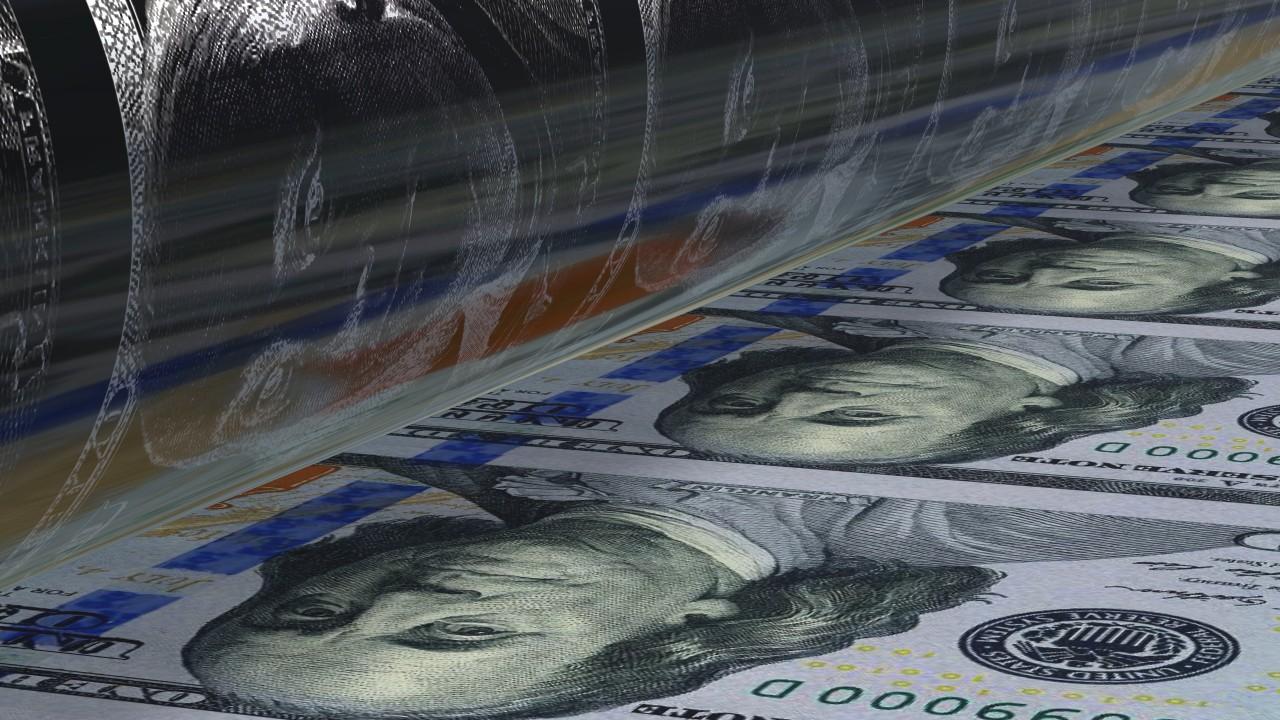“We have completed our very successful attack on the three Nuclear sites in Iran, including Fordow, Natanz, and Esfahan. All planes are now outside of Iran air space,” wrote President Trump on Truth Social Saturday evening. “IRAN MUST NOW AGREE TO END THIS WAR”, Trump wrote in a second Truth Social post. “This is an HISTORIC MOMENT FOR THE UNITED STATES OF AMERICA, ISRAEL, AND THE WORLD.” Bitcoin traded down a couple percent to 101,200 on the headlines, then bounced to 102,500 in the aftermath of Trump’s 10pm ET address to the nation. Using Bitcoin as a proxy for the stock market, I’d say the S&P 500 would’ve been down half a percent from Friday’s close.
Overall: “In the future, the global monetary system may continue to evolve towards a pattern in which a few sovereign currencies coexist, compete with each other, and check and balance each other,” said China’s central bank governor, Pan Gongsheng, pitching you guessed what. “When geopolitical conflicts, national security interests or even wars occur, the international dominant currency is easily instrumentalized and weaponized,” continued Pan, his nation racing to reduce the monetary consequences of a future conflict over Taiwan. “Multilateral cooperation is being replaced by zero-sum thinking and bilateral power plays. Openness is giving way to protectionism. There is even uncertainty about the cornerstone of the system: the dominant role of the US dollar,” said ECB Chief Christine Lagarde, flogging, you guessed it. “Any change in the international order that leads to lower world trade or fragmentation into economic blocs will be detrimental to our economy. But – with the right policy responses – there could also be opportunities. The changing landscape could open the door for the euro to play a greater international role,” she continued, in a rather thoughtful speech for a central banker [transcript here]. “A dynamic, integrated European economy where the opportunities to invest in equity, where the opportunities to invest in innovative firms, is more present” would lure inflows into Europe’s single currency, said International Monetary Fund Managing Director Kristalina Georgieva, sucking up to the Europeans, wondering how much longer it takes before Trump Harvard’s her organization. “With the EU moving towards a higher level of spending in defense, towards integrating its energy system, that provides material opportunity for euro-based assets to grow,” she said. And Martin Schlegel, Switzerland’s central bank chief, didn’t say much. He just cut rates back to 0.00% and hoped no one would really notice. As the tsunami of global liquidity, built up over decades of money printing across all the world’s major economies, seeks a safe haven.
Weekly Close: S&P 500 -0.2% and VIX -0.20 at +20.62. Nikkei +1.5%, Shanghai -0.5%, Euro Stoxx -1.5%, Bovespa -0.1%, MSCI World -0.5%, MSCI Emerging -0.02%, Bitcoin +0.6%, and Ethereum -0.3%. USD rose +1.9% vs Sweden, +1.4% vs Yen, +1.1% vs Mexico, +1.1% vs Canada, +0.9% vs Sterling, +0.6% vs Turkey, +0.6% vs India, +0.6% vs Indonesia, +0.5% vs Australia, +0.3% vs Chile, +0.3% vs South Africa, and +0.2% vs Euro. USD fell -1.9% vs Russia, -0.5% vs Brazil, and flat vs China. Gold -1.9%, Silver -0.9%, Oil +3.6%, Copper +0.3%, Iron Ore -4.1%, Corn -0.4%. 10yr Inflation Breakevens (EU +2bps at 1.77%, US +5bps at 2.34%, JP +2bps at 1.50%, and UK +1bp at 3.17%). 2yr Notes -4bps at 3.91% and 10yr Notes -2bps at 4.38%.
2025 Year-to-Date Equity Index Returns: Hungary +40.8% priced in US dollars (+24.2% priced in forint), Poland +40.3% priced in dollars (+26.2% priced in zloty), Czech Republic +36.8% in dollars (+21.6% in koruna), Greece +36.7% (+22.6%), Korea +35.4% (+25.9%), Spain +33.2% (+19.5%), Norway +32.8% (+17.9%), Austria +31.3% (+18.3%), Portugal +30.7% (+17.3%), Germany +30.2% (+17.3%), Colombia +28.7% (+19.4%), Brazil +27.8% (+14%), Ireland +27.7% (+14.6%), Italy +27.4% (+14.8%), Chile +26.6% (+20.4%), Mexico +23.9% (+13.6%), Israel +23.2% (+18.2%), South Africa +21.6% (+15.6%), Finland +21.5% (+10.3%), Euro Stoxx 50 +19.2% (+6.9%), HK +16.1% (+17.3%), Belgium +16% (+4.1%), UK +15.5% (+7.4%), Netherlands +15.3% (+3.4%), France +14.6% (+2.8%), Switzerland +13.4% (+2.3%), Canada +12.3% (+7.2%), Sweden +12.3% (-1.4%), Singapore +9% (+2.5%), Australia +8.9% (+4.2%), Taiwan +6.3% (-4.3%), India +5% (+6.2%), MSCI World +4.7% in dollars, Vietnam +3.9% (+6.5%), Japan +3.7% (-3.7%), New Zealand +2.3% (-4.1%), China +1.9% (+0.2%), S&P 500 +1.5%, UAE +1% (+1%), NASDAQ +0.7%, Philippines -1.7% (-2.9%), Indonesia -3.8% (-2.4%), Malaysia -3.8% (-8.5%), Denmark -3.9% (-13.4%), Russell -5.4%, Saudi Arabia -11.8% (-11.8%), Turkey -16.5% (-6.4%), Thailand -20.4% (-23.8%), and Argentina -27.7% (-18.5%).
Privilege: “Shifts in the global currency landscape are not unprecedented in monetary history,” said ECB Chief Lagarde. “There have been previous episodes where the world’s leading reserve currency issuer has taken steps that have called that leadership into question, without ultimately jeopardizing it. For example, the US dollar took over from the pound sterling as the world’s leading reserve currency in the mid-1920s, with its share in foreign exchange reserves rising to 64% by 1931. But this leading position did not stop the US taking measures to unilaterally change the international monetary order.”
Privilege II: “In 1933 President Roosevelt suspended gold convertibility to fight the deflationary forces of the Great Depression,” continued Lagarde. “He dismissed European demands for fixed exchange rates with the argument that “the sound internal economic system of a nation is a greater factor in its well-being than the price of its currency”. In the 1970s President Nixon ended the Bretton Woods system by unilaterally suspending dollar convertibility to gold and imposing a 10% import tariff. Faced with growing imbalances between US current account deficits and the surpluses of western Europe and Japan, Treasury Secretary John Connally declared that “no longer can considerations of friendship, or need, or capacity justify the United States carrying so heavy a share of the common burdens.”’
Privilege III: “On both occasions, there was a decline in the standing of the US dollar as a foreign reserve currency,” said Lagarde. “In the 1930s, it fell from over 60% to around 20% of global foreign exchange reserves. In the 1970s, it fell from about 70% to 50% two decades later. But on neither occasion was there a robust alternative currency that could take over at short notice. In the 1930s, the pound sterling was already declining, while in the 1970s the Deutsche Mark and the Yen were backed by markets that were too small. So, instead, investors flocked to gold. The share of gold in foreign reserves increased by about 20 percentage points in the 1930s to 97% and almost doubled to 60% in the 1970s.”
Privilege IV: “Today, there is a key difference compared with previous eras,” said Christine. “With the euro as the world’s second-largest currency, there is another international currency alongside the dollar. But this has not yet convinced investors. Over recent years, the dollar’s share in global foreign exchange reserves has fallen, with its current level of 58% being the lowest since 1994. In parallel, central banks have been accumulating gold at a record pace – almost matching the levels seen during the Bretton Woods era. The share of gold in global foreign reserves has reached around 20%, surpassing that of the euro.”
Privilege V: “For the euro to increase its global status, history tells us that we need to build on three foundations – each of them critical for success,” explained Lagarde. “First, Europe must ensure it has a solid and credible geopolitical foundation by maintaining a steadfast commitment to open trade and underpinning it with security capabilities. Second, we must reinforce our economic foundation to make Europe a top destination for global capital, enabled by deeper and more liquid capital markets. Third, we must bolster our legal foundation by defending the rule of law – and by uniting politically so that we can resist external pressures.”
Privilege VI: “In the history of the international monetary system, there are moments when the foundations that once seemed unshakeable begin to shift,” concluded the ECB Chief, selling hard. “The economist Robert Triffin described this with great clarity. He observed that nations’ confidence in the international monetary system depends on the reliability of the reserve currency, which, in his words, is “highly dependent on individual countries’ decisions”. But moments of change can also be moments of opportunity. The ongoing changes create the opening for a “global euro moment”. This is a prime opportunity for Europe to take greater control of its own destiny. But this is not a privilege that will simply be given to us. We have to earn it.”
Anecdote: Currencies are rather boring. And I say that, having spent my career watching their movements every single trading day, and on most night’s at 3am out of habit, which is a somewhat pathetic admission. But, oh well. Basically, three currencies matter. The dollar, the euro, and the renminbi. All the others are fine to punt around, but they’re too small to matter, a bit like dogecoin. Some people still care about the yen. In a crisis it used to surge as panicked Japanese repatriated overseas savings. Savvy investors used it as a hedge. But that trade no longer works reliably, probably because Japanese government debt is totally out of control and will get inflated away someday, taking the yen with it. That leaves the Swiss franc as the only remaining currency hedge. But markets price risk well, so the franc is perpetually expensive and has lost its convexity. The dollar used to rally in major panics like 2008, when the poor souls across the planet who borrowed greenbacks and swapped them for their own crappy currencies were forced to reverse the trade and repay their loans. But it too has recently become unreliable in a panic, which has led traders to speculate that a great dollar crisis is unfolding. The odds have certainly risen a ton. But in a world of deeply indebted nations, each with profound social, economic, political, and structural issues that politicians continually paper over with purring printing presses, it’s difficult to handicap which currency will suck worst. For as long as China is a communist police-state governed by an autocrat, it won’t be a credible reserve currency. Europe has a better chance, although the obstacles it must overcome are enormous, and were well articulated by Mario Draghi in the EU Competitiveness Report [here]. So, the real trade is to borrow these depreciating pieces of paper, irrespective of which sovereign prints them, and exchange that currency for assets that are truly scarce.
Good luck out there,
Eric Peters
Chief Investment Officer
One River Asset Management
Disclaimer: All characters and events contained herein are entirely fictional. Even those things that appear based on real people and actual events are products of the author’s imagination. Any similarity is merely coincidental. The numbers are unreliable. The statistics too. Consequently, this message does not contain any investment recommendation, advice, or solicitation of any sort for any product, fund or service. The views expressed are strictly those of the author, even if often times they are not actually views held by the author, or directly contradict those views genuinely held by the author. And the views may certainly differ from those of any firm or person that the author may advise, converse with, or otherwise be associated with. Lastly, any inappropriate language, innuendo or dark humor contained herein is not specifically intended to offend the reader. And besides, nothing could possibly be more offensive than the real-life actions of the inept policy makers, corrupt elected leaders and short, paranoid dictators who infest our little planet. Yet we suffer their indignities every day. Oh yeah, past performance is not indicative of future returns.





